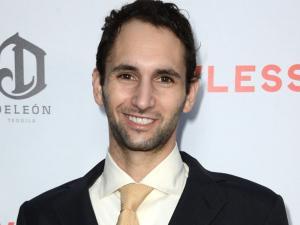Relativity Media is gone…for now. Declaring itself “hopelessly insolvent,” the mini-major film studio had to lay off 75 of its employees and file for Chapter 11 bankruptcy. Now its founder and CEO Ryan Kavanaugh is making some juicy allegations in tell-all interviews, painting himself as the victim of an attempted hostile takeover on the eve of his company going public. On the opposite end of the spectrum, a brand new mini-major, STX Entertainment, releases its first movie tomorrow, the Jason Blum-produced horror flick The Gift. Backed by $3 billion in seed money from Chinese investors, STX, which is run by former Universal Pictures chairman Adam Fogelson, plans to release as many as 15 midbudget ($25m to $75m) movies per year through 2017.
Oh, yeah, and the guys who were responsible for releasing Snowpiercer on VOD through The Weinstein Co.’s specialty label Radius last year are leaving to, as THR put it, “start a new company that will have a traditional theatrical release, unlike the day-and-date model of Radius.”
If you work in the film industry, all of this must be remarkably intriguing, particularly the soap opera playing out with Ryan Kavanaugh. He’s always been a controversial figure in Hollywood, flying helicopters, palling around with Leonardo DiCaprio and claiming he’d discovered a formula which reinvented the business of filmmaking. Even as Relativity’s movies continued to flop, Kavanaugh insisted his finances were based on a complicated set of algorithms which minimized risks, regardless of what budget-to-box-office-gross comparisons looked like.

Relativity ponied up $4 million to buy Don Jon at a film festival, and guaranteed it a wide release and $25m marketing spend. It only grossed $30m at the worldwide box office.
Now, the bankruptcy filing shows Relativity has a little less than $600 million in assets and nearly $1.2 billion in liabilities. That seems pretty bad, right?
But what are we, as film fans, losing if Relativity can’t recover, and, conversely, what are we gaining if STX Entertainment takes off? What the heck is a mini-major studio anyway?

Today’s mini-majors are the ones releasing the type of thoughtful dramas, dark comedies, oddball thrillers and experimental efforts the major studios (Disney, WB, Paramount, Universal, Fox, Sony) used to before they became preoccupied with chasing after $1 billion-grossing franchises. As Forbes argued, mini-majors can’t afford blockbuster film budgets so “their annual slate is generally filled with the likes of the very kind of smaller-scale, star-driven, often adult-skewing movies that we all like to pretend Hollywood doesn’t make any more.” That’s what we’re potentially losing when something like Relativity enters into a court-assisted reorganization, and it’s also what we’re gaining by STX committing itself to exclusively make midbudget movies even though its first one, The Gift, is more of a micro-budget affair it picked up after all the other studios passed.

As Mad Men’s Matthew Weiner put it, “Something happened that nobody can make a movie between $500,000 and $80 million. That can’t be possible.” It’s absolutely possible, and the reason has a lot to do with out of control marketing costs. As Flavorwire explained, “In the modern, crowded multimedia landscape, the kind of saturation marketing that makes [the studios] feel comfortable is very, very expensive. Sometimes it’s 50 percent of the production budget, and sometimes it’s even more. And that high price tag is why, counter-intuitive though it might seem, a studio would rather make a $100 million movie than, say, a $10 million one. Studios are no longer interested in small investments with small return, which aren’t worth the time or the money.”
The mini-majors are trying to fill that void, and Lionsgate is thriving, boasting multiple franchises (Hunger Games, Divergent, Now You See Me) which allow it to spend more on budgets. Others are struggling, partially because they can’t match the marketing dollars spent by the majors. Thus far, the lesson seems to be that if you want to be a mini-major you’d better have billions in funding from China (STX) or hit high enough with one or two movies that someone bigger will buy you out, like Lionsgate taking over Summitt after they had Twilight or FilmDistrict merging with Universal’s Focus Features after Insidious. Or if you expand outside of the mini-majors and look at promising production companies it helps if your CEO is the daughter of a billionaire (Megan Ellison’s Annapurna), and she works really hard to invest in directors (e.g., David O. Russell, Spike Jonze, Kathryn Bigelow) who’ll churn out fantastic movies.
Here are some of the mini-majors or production companies which have failed in recent years, followed by a couple which are sticking around:
GONE (FOR NOW)
1) Relativity

2004-?
Biggest Hits: Season of the Witch, Limitless, Immortals, Act of Valor, Mirror Mirror, Safe Haven, Free Birds, Earth to Echo, Oculus
Biggest Misses: The Warrior’s Way, Out of the Furnace, Haywire, Paranoia, Out of the Furnace, Black or White, Don Jon, Machine Gun Preacher, The Best of Me
As recently as mid-2013, Relativity had a 5% marketshare, making it the third biggest mini-major behind LionsGate and The Weinstein Co. Now, Kavanaugh is fighting to remain the CEO throughout the bankruptcy, claiming the company will be back bigger and better than ever. Sadly, Relativity had multiple films slated for release through 2016, and it chose to hold on to most of them even though there’s no money to actually distribute them. At last check, they cut the troubled western Jane Got a Gun loose meaning another distributor can pick it up, but they still have the Melissa Rauch black comedy/film festival hit The Bronze and the Kristin Wiig, Zach Galifianakis, Owen Wilson comedy Masterminds.
2) Benaroya Pictures

Michael Benaroya, whose production company started in 2009
Biggest Hits: Lawless, Margin Call
Biggest Misses: The Paperboy, Kill Your Darlings, Hateship, Loveship, Cymbeline
As summarized by The Flickering Myth earlier this year, “In November 2014, Idol’s Eye, starring Robert De Niro and Robert Pattinson, shut down production, and this week Bruce Willis, along with director John Pogue, left the film Wake after production had been ‘temporarily’ stopped earlier in the year. Both films were to be produced by Benaroya Pictures, the company behind films such as Lawless, The Paperboy and Kill Your Darlings; films that may have got the plaudits from critics, but hardly set the box office alight. The fact that they have had two films stall in the past year does not bode well for any future offerings from the company; as Oscar Wilde didn’t quite say, to have one film closed due to financial trouble is unfortunate, to have two shut down is careless. That both these films were from the same production company also hints at a larger issue that will surely be revealed at some point, but until then we can only speculate why they might have closed up production.” Neither Idol’s Eye nor Wake appear to have resumed production, and Benaroya’s only other movie on tap is Z for Zachariah.
3) Overture Films

2006-2010
Biggest Hits: The Visitor, Last Chance Harvey, Sunshine Cleaning, Law Abiding Citizen, The Men Who Stare At Goats, The Crazies
Biggest Misses: Mad Money, Traitor, Righteous Kill, Capitalism: A Love Story, Let Me In, Stone
An affiliate of Starz and Anchor Bay Entertainment, Overture couldn’t quite cut it as a mini-major-like studio, and ironically some of its assets were eventually sold off to Relativity Media.
4) FilmDistrict

2010-2014
Biggest Hits: Insidious, Drive, Looper, Olympus Has Fallen, Evil Dead, Insidious: Chapter 2
Biggest Misses: The Rum Diary, Red Dawn, Playing for Keeps, Parker, Oldboy
Under Peter Schlessel’s direction, FilmDistrict made/purchased between four and eight wide releases per year, distributing them through either Sony Pictures or Open Road Films. They were also an early Netflix adopter, signing a deal with them in 2010. However, after Schlessel was hired as the new CEO of Universal’s specialty label Focus Features the FilmDistrict doors were shuttered since Schlessel took most of the company’s assets with him.
STILL AROUND
1) Open Road Films

2011-Present
Biggest Hits: The Grey, End of Watch, A Haunted House, Jobs, The Nut Job, Chef, Nightcrawler, Dope
Biggest Misses: Killer Elite, The Host, Machete Kills, Sabotage, The Gunman
As summarized by SSN Insider, “Open Road Films is a joint venture by the country’s two largest theater chains, AMC Entertainment and Regal Entertainment, forming their own domestic theatrical distribution company with CEO Tom Ortenberg. The partnership effectively puts these exhibitor giants—Regal and AMC together own more than 12,500 screens across the U.S.—into a role usually reserved for studios: the distribution and marketing of films. Open Road’s movies aren’t limited to only AMC and Regal screens and open in wide-release across the U.S.” It’s considered a mini-major.
2) Annapurna Pictures

2011-Present
Biggest Hits: Zero Dark Thirty, Spring Breakers, Her, American Hustle
Biggest Misses: The Master, Foxcatcher
Megan Ellison, the daughter of a tech billionaire, dropped out of film school to become a film producer, and has since had the midas touch, releasing almost nothing but solid awards contenders even if a couple of them weren’t exactly box office hits. Annapurna Pictures is also responsible for the upcoming David O. Russell-Jennifer Lawrence-Bradley Cooper reunion Joy.
3) A24

2012-Present
Biggest Hits: The Bling Ring, The Spectacular Now, The Obvious Child, Ex Machina,
Biggest Misses: Under the Skin, The Rover, Life After Beth, A Most Violent Year
In its short life, A24, a mini-major established by industry veterans Daniel Katz, David Fenkel, and John Hodges, has been an active buyers on the film festival circuit, allowing it to put out 12 movies last year and another 12 this year. It has embraced VOD releases and alternate distribution methods, such as its exclusive deal with DirectTV for Slow West. At the moment, their newest film, the Jesse Eisenberg-Jason Segal drama The End of the Tour, has generated a lot of buzz, and their first venture into TV, USA’s sitcom Playing House, just started its second season.
4) Picturehouse

2013-Present
Biggest Hit: The Guest
Biggest Miss: Metallica: Through the Never
Picturehouse began its life as a speciality label for New Line Cinema and HBO in 2005, most famously releasing The Notorious Bettie Paige, A Prairie Home Companion, Pan’s Labyrinth, The Orphanage and Simon Pegg’s Run, Fatboy, Run. However, when Warner Bros. consolidated New Line in 2008 Picturehouse was discontinued. In 2013, former Picturehouse boss Bob Berney bought back the company name and logo, setting it up as a new mini-major. It’s been slow-going ever since then, with just one release on the horizon, a rom-com with Ashley Judd (Big Stone Gap) due in October.

